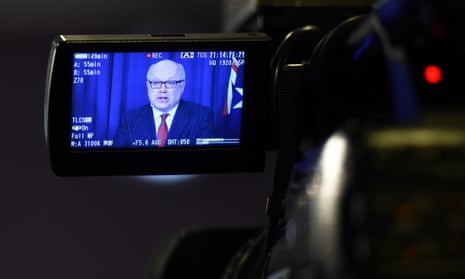A committee reviewing changes to Australia’s national security laws has rejected calls for journalists to be exempt from a new measure criminalising disclosure of “special intelligence operations”.
But the parliamentary joint committee on intelligence and security recommended changes to the Abbott government’s bill, including greater oversight of such operations and written confirmation that the director of public prosecution must take into account the public interest in publication.
The bill, intended to increase and update intelligence agency powers, would create a new framework for covert operations involving conduct that would otherwise breach criminal law.
These special intelligence operations would be authorised by Australian Security Intelligence Organisation (Asio) chiefs and any person who disclosed information about these matters could face a jail term of up to five years. The maximum penalty would increase to 10 years if the information could endanger lives.
Lawyers, news organisations and the media union raised serious concerns that the offence provisions were broad enough to capture journalists who published Snowden-style revelations considered to be in the public interest.
The parliamentary committee, which includes Labor and Coalition members, published a report on Wednesday saying it was not “appropriate to provide an explicit exemption for journalists from the proposed offence provisions”.
“Part of the reason for this is that the term ‘journalism’ is increasingly difficult to define as digital technologies have made the publication of material easier,” the report said.
“The committee considers that it would be all too easy for an individual, calling themselves a ‘journalist’, to publish material on a social media page or website that had serious consequences for a sensitive intelligence operation. It is important for the individual who made such a disclosure to be subject to the same laws as any other individual.”
Special intelligence operations were expected to be used “only in the most highly sensitive circumstances” and required a higher level of information protection than other operational matters, the report said.
The committee said it had “paid close attention to concerns raised by inquiry participants about the potential impact of the proposed offences on press freedom”. It said, however, that “in order to ensure the success of highly sensitive operations and to protect the identity of individuals involved” it was essential that information on these operations not be disclosed.
The report recommended some changes in order to go some way to allay the concerns over the prospect of journalists being jailed.
It called for the bill to “be amended or, if not possible, the explanatory memorandum of the bill be clarified, to confirm that the commonwealth director of public prosecution must take into account the public interest, including the public interest in publication, before initiating a prosecution”.
The committee also recommended additional exemptions to explicitly enable disclosure of information for the purpose of obtaining legal advice and in the course of inspections by the inspector general of intelligence and security (IGIS), an oversight body.
Other recommendations were aimed at boosting the involvement of IGIS, including a requirement that it be notified by Asio when a special intelligence operation was approved and when any such operation was intended to continue for more than six months.
Asio would also have to notify the attorney general and IGIS in six-monthly reports of any injury, loss or damage caused to a person or property in the course of these operations.
The government’s bill states that special intelligence operations would be approved internally in Asio by the director general or deputy director general of security. But the committee suggested that approval be obtained by the attorney general before an operation was commenced, varied or extended beyond six months.
It also proposed a requirement that use of force by Asio officers be reported to the attorney general and the IGIS within 24 hours.
In the interests of greater oversight at a time of major changes to national security laws, the government should increase funding to the office of the IGIS and should appoint a new independent national security legislation monitor as soon as possible, the report said. The monitor role was previously filled by Bret Walker SC but his term expired earlier this year. The government abandoned its earlier plans to scrap the position in the interests of “red tape” reduction.
The chairman of the committee, Liberal MP Dan Tehan, said the bipartisan report recommended the bill be passed but the 16 recommendations would give greater clarity and strengthen the safeguards and oversight mechanisms in the bill.
“The committee has sought to ensure that the bill achieves an appropriate balance between national security requirements and the necessary safeguards that the community expects,” Tehan said. “The committee has tabled its report out of session to facilitate debate on this important legislation when parliament returns.”
Labor welcomed the report, saying the committee had suggested “significant improvements” and the opposition looked forward to considering an amended draft of the bill. The shadow attorney general, Mark Dreyfus, said security agencies needed the necessary powers to keep Australians safe but it was critical these powers were accompanied by proper oversight.
“It is now up to the government to respond to the committee’s recommendations and draft necessary amendments to the bill,” Dreyfus said. “For example, sections of the bill will need to be redrafted by the government to ensure that our democratic freedoms, such as freedom of speech and of the press, are not inappropriately constrained by the new laws.”
Comment is being sought from the attorney general, George Brandis, on the government’s willingness to consider the amendments.
The bill, to be debated in coming weeks, is the first in three stages of the government’s planned national security reforms. A second bill, expected to be presented to parliament in the next sitting fortnight, will seek to make it easier to detain and prosecute Australians returning from fighting with militant groups overseas and the third bill will legislate a mandatory data retention scheme.

Comments (…)
Sign in or create your Guardian account to join the discussion